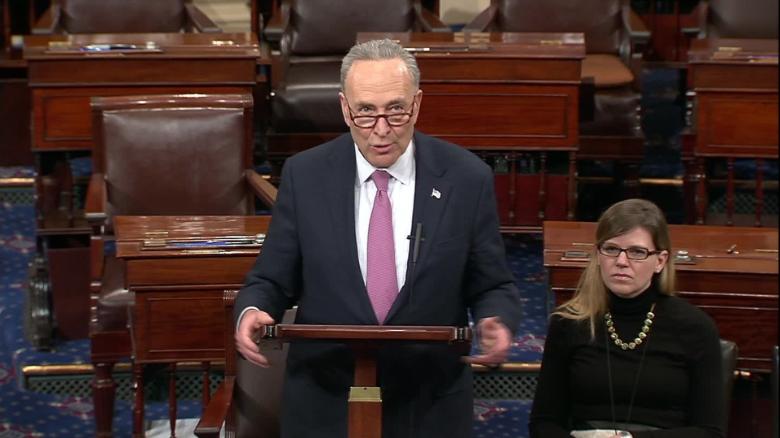Story highlights
- GOP leaders have been in touch repeatedly with President Donald Trump
- Both parties are already playing a blame game
(CNN)The government will shut down at 12:00:01 a.m. ET, Saturday morning. Nobody on either side -- Senate or House; Republican or Democrat -- sees a different path at this point.
Barring some dramatic change in the dynamic in the next 12 hours or so, that's where things are headed.
Quite a way for the President to spend the one year anniversary of his inauguration.
What comes next: At some point there will be a Senate cloture vote -- a 60-vote threshold that both sides know will fail. But there hasn't been an agreement on when yet. If there's no agreement, it likely wouldn't take place until early Saturday morning.
After that: TBD, but expect Republicans to continue offering the spending bill -- and several other difficult political votes, for the near future.
What really comes next: The blame game. That's the focus right now -- tag the other side for everything reaching this point -- as no solution to avert a government shutdown appears within sight.
On Friday morning, a senior administration official told CNN that Department of Homeland Security Secretary Kirstjen Nielsen and White House chief of staff John Kelly will participate in a meeting with congressional whips from both sides of the Senate, House Democratic Whip Steny Hoyer of Maryland and House Majority Leader Kevin McCarthy of California.
The wild card
It's the President. Plain and simple.
GOP leaders have been in touch with Trump repeatedly, aides tell CNN. He knows where they stand, how they plan to proceed and is aligned with that strategy. But those same aides acknowledge they have no idea long that actually lasts.
"We all know anything can happen at any time on Twitter," one House Republican aide told CNN. "But for now we're all in the same place."
Here's all you need to know about where things stand
The Senate floor, late Thursday night, made clear everything you need to know about this moment. Senate Majority Leader Mitch McConnell asked for a vote majority-threshold vote on the House-passed short-term funding bill he knew wouldn't get taken up, Minority Leader Chuck Schumer objected.
The New York Democrat asked for a vote on the 60-vote cloture motion he knew would fail, McConnell objected.
They could barely agree on when to actually adjourn.
They couldn't even agree on what time the next vote will be -- a vote that both sides already know will fail.
There are now more partisan hashtags flying around than actual solutions being presented that would get each party's leadership into a room to negotiate.
Aides in both parties are past even trying to act like there's a pathway to avoid a shutdown. They've chosen, for the moment, the path of bludgeoning one another instead.
Here's the reality: Senior GOP aides in both chambers say Senate Republican leaders have no plan to move off their insistence that the House-passed bill is the only way forward -- and they are queuing up a series of painful political votes for in-cycle Democrats.
Democrats didn't go into a shutdown posture to come away empty-handed and want at least new negotiations on the leadership level before they even consider any off-ramp.
When the Senate reconvenes on Friday, there will be 13 hours until a shutdown. As one senior Republican aide put it Thursday night: "This is going to get worse before it gets better."
So, how does this all end: Often, in stand offs like this, there are clear solutions that are hanging out there top advisers in both parties will acknowledge are the end game, it's just that one or both parties just need to go through the process (or, to put it bluntly, punch themselves out) before getting there.
Republicans
To make this abundantly clear: Speaker Paul Ryan and McConnell are completely aligned that the House-passed bill is their final offer.
Something addressing the expiring Deferred Action for Childhood Arrivals program is not even remotely possible in their minds at this point, multiple aides say.
Democrats
On the other side, Democrats -- joined by several Republicans -- say they just finally hit their limit. There's zero trust with the White House and, more importantly, GOP leaders that the DACA issue will be addressed with more time. There's a keen awareness how complicated and divisive the issue is inside the Republican conference and how many times immigration as an issue has withered away in the past.
There's tremendous pressure from the Democratic base, yes, but that's not all this is -- there's extreme frustration on the Democratic side with the process, with their role in the minority and with the last 12 months.
If DACA would be addressed, Democratic aides say, a whole host of major items would unlock -- a two-year budget deal, disaster relief bill, CHIP extension (which, of course, is also in the Republican short-term spending bill.)
What matters
Whether or not leaders from both sides come out of their respective messaging trenches and start meeting. Most aides (and lawmakers) are predicting it will take a day or two of fighting before they reach that point. But that will be the key that something is starting to shake lose. What that will be, of course, is anybody's guess.






